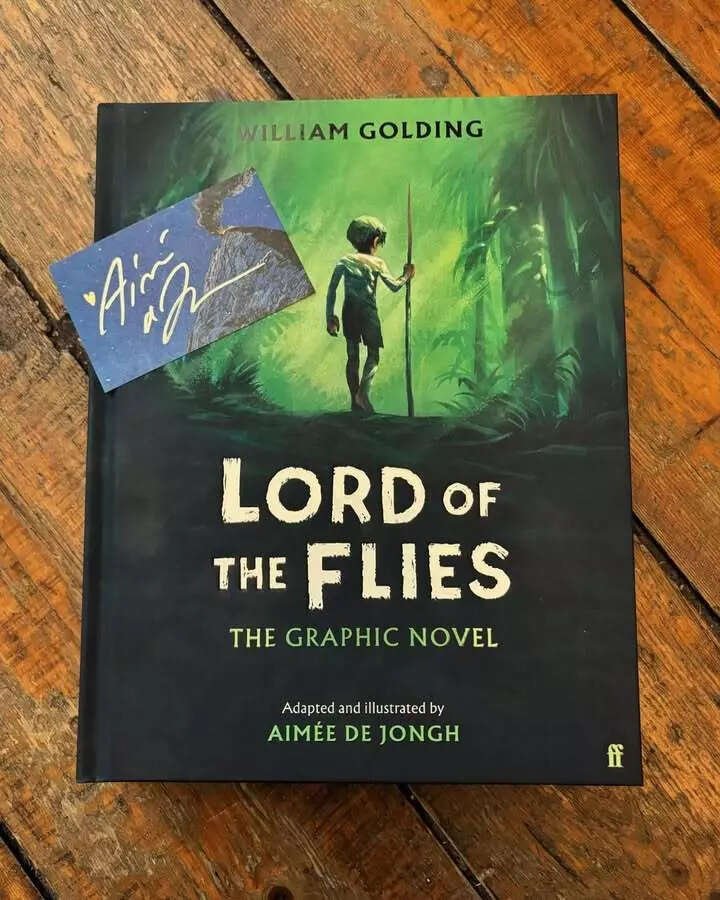Ethics & Policy
10 Hauntingly Dark Classic Books That Will Leave You Unsettled and Thinking for Days | Features

10 Hauntingly Dark Classic Books That Will Leave You Unsettled and Thinking for Days (Picture Credit – Instagram)
Some books entertain, others enlighten—but a rare few haunt your thoughts for days. The novels on this list burrow deep into your psyche, weaving tales of psychological horror, existential dread, and moral ambiguity. From gothic hauntings to dystopian nightmares, these classic works refuse to be forgotten. They force us to question the nature of evil, identity, and human frailty. Prepare yourself for ten unsettling masterpieces that will leave you questioning reality long after the last page.
1. The Stranger by Albert Camus
Meursault’s detachment from society makes this novel an unsettling existential masterpiece. His indifferent reaction to his mother’s death and a senseless crime unravel the absurdity of human existence. The novel’s cold narrative forces readers to confront life’s meaningless nature, making them question morality, justice, and purpose. Camus’ sparse prose heightens the bleakness, leaving an eerie void that lingers. ‘The Stranger’ is not just a novel but a psychological confrontation that stays with you long after the final page, making you ponder the nature of existence itself.

2. Dracula by Bram Stoker
The terror of Count Dracula goes beyond bloodthirst; it seeps into the depths of human fear. Stoker’s novel is an unsettling blend of folklore, paranoia, and sensual horror, creating a suffocating gothic atmosphere. The epistolary format intensifies the suspense, drawing readers into the helplessness of its characters. ‘Dracula’ is more than a vampire story—it’s an exploration of fear, desire, and the darkness lurking within. The psychological dread it instils makes it a timeless horror that continues to haunt, leaving an indelible mark on the imagination.
3. Crime and Punishment by Fyodor Dostoevsky
A descent into guilt and madness, this novel follows Raskolnikov, a man who justifies murder with twisted logic. Dostoevsky’s psychological depth plunges readers into his fractured mind, making every moment of paranoia and despair feel visceral. The novel’s philosophical dilemmas about morality and redemption linger long after reading. ‘Crime and Punishment’ is an intense psychological battle that forces readers to confront the consequences of guilt, leaving a sense of unease that refuses to fade, making one question the thin line between morality and madness.
4. Rebecca by Daphne du Maurier
The lingering presence of the deceased Rebecca creates an atmosphere of inescapable dread. The unnamed narrator finds herself in the shadow of her husband’s first wife, whose presence haunts every corner of Manderley. The psychological manipulation and eerie tension make ‘Rebecca’ a gothic masterpiece. The slow unravelling of secrets and the creeping horror of obsession transform this novel into a chilling psychological thriller that lingers in the mind. Its unsettling conclusion ensures it remains a disturbing read long after the final sentence is absorbed.
5. The Collector by John Fowles
Obsession takes a terrifying form in this disturbing novel. A socially inept man kidnaps an art student, believing his twisted love will make her love him in return. The psychological torment and power dynamics between captor and captive create unbearable tension. The shifting perspectives intensify the horror, making ‘The Collector’ an unrelenting psychological thriller. It forces readers to witness the terrifyingly plausible descent into obsession and control, leaving them unsettled and disturbed by the chilling realism of human depravity.

6. A Clockwork Orange by Anthony Burgess
This dystopian novel explores the horrors of free will and state control through Alex, a violent youth stripped of his ability to choose between good and evil. The novel’s twisted language, ‘Nadsat,’ immerses readers in its unsettling world, making it even more disturbing. Burgess’ vision of psychological conditioning raises questions about morality, punishment, and the essence of humanity. ‘A Clockwork Orange’ remains a deeply unnerving read that lingers in the subconscious, its themes of manipulation and violence continuing to resonate disturbingly.
7. Invisible Man by Ralph Ellison
An unflinching look at racial identity and societal erasure, this novel follows an unnamed protagonist navigating a world that refuses to see him. The psychological and emotional toll of being invisible to society creates a haunting and deeply unsettling experience. Ellison’s sharp prose and surreal moments blur the line between reality and hallucination, amplifying the novel’s impact. ‘Invisible Man’ is a disturbing yet essential read that exposes the darkness of societal neglect, leaving an indelible mark on readers as they grapple with its implications.
8. The Island of Dr. Moreau by H.G. Wells
The horrors of unchecked scientific ambition manifest in this chilling tale of human-animal hybrids. As the protagonist uncovers Dr. Moreau’s grotesque experiments, the boundaries between humanity and monstrosity blur. The novel’s eerie setting and moral ambiguity create an atmosphere of profound unease. ‘The Island of Dr. Moreau’ forces readers to question the ethics of science, the fragility of civilization, and the terrifying potential of unchecked power. Its harrowing implications ensure it remains one of the most thought-provoking horrors of its time.
9. Lord of the Flies by William Golding
Civilization collapses, and primal instincts emerge in this harrowing tale of boys stranded on an island. As order deteriorates, the darkness within human nature surfaces in brutal ways. The novel’s unsettling realism and psychological horror make it a deeply disturbing read. ‘Lord of the Flies’ forces readers to confront the fragile nature of morality and the lurking savagery within society. Its brutal honesty about human nature lingers for days, making one question the stability of societal order itself.

10. The Turn of the Screw by Henry James
A governess descends into paranoia as she believes the children under her care are haunted by malevolent spirits. But is the haunting real, or is she losing her mind? This ambiguity creates an atmosphere of relentless dread. ‘The Turn of the Screw’ is a masterpiece of psychological horror, playing on perception, fear, and the unknown. The novel’s oppressive suspense and lingering uncertainty ensure it remains one of the most unsettling ghost stories ever written, its chilling ambiguity haunting the mind indefinitely.
The power of these novels lies not in cheap scares, but in their ability to unsettle the reader’s deepest fears. Whether it’s the eerie isolation of ‘Rebecca,’ the psychological torment of ‘Crime and Punishment,’ or the existential dread of ‘The Stranger,’ each book forces an introspective reckoning. They challenge our perception of morality, identity, and the fragility of the human psyche. If you crave stories that linger in the mind, leaving you disturbed yet mesmerized, these dark classics are waiting to haunt you, long after the last page is turned.
Ethics & Policy
Your browser is not supported
jacksonville.com wants to ensure the best experience for all of our readers, so we built our site to take advantage of the latest technology, making it faster and easier to use.
Unfortunately, your browser is not supported. Please download one of these browsers for the best experience on jacksonville.com
Ethics & Policy
Navigating the Investment Implications of Regulatory and Reputational Challenges

The generative AI industry, once hailed as a beacon of innovation, now faces a storm of regulatory scrutiny and reputational crises. For investors, the stakes are clear: companies like Meta, Microsoft, and Google must navigate a rapidly evolving legal landscape while balancing ethical obligations with profitability. This article examines how regulatory and reputational risks are reshaping the investment calculus for AI leaders, with a focus on Meta’s struggles and the contrasting strategies of its competitors.
The Regulatory Tightrope
In 2025, generative AI platforms are under unprecedented scrutiny. A Senate investigation led by Senator Josh Hawley (R-MO) is probing whether Meta’s AI systems enabled harmful interactions with children, including romantic roleplay and the dissemination of false medical advice [1]. Leaked internal documents revealed policies inconsistent with Meta’s public commitments, prompting lawmakers to demand transparency and documentation [1]. These revelations have not only intensified federal oversight but also spurred state-level action. Illinois and Nevada, for instance, have introduced legislation to regulate AI mental health bots, signaling a broader trend toward localized governance [2].
At the federal level, bipartisan efforts are gaining momentum. The AI Accountability and Personal Data Protection Act, introduced by Hawley and Richard Blumenthal, seeks to establish legal remedies for data misuse, while the No Adversarial AI Act aims to block foreign AI models from U.S. agencies [1]. These measures reflect a growing consensus that AI governance must extend beyond corporate responsibility to include enforceable legal frameworks.
Reputational Fallout and Legal Precedents
Meta’s reputational risks have been compounded by high-profile lawsuits. A Florida case involving a 14-year-old’s suicide linked to a Character.AI bot survived a First Amendment dismissal attempt, setting a dangerous precedent for liability [2]. Critics argue that AI chatbots failing to disclose their non-human nature or providing false medical advice erode public trust [4]. Consumer advocacy groups and digital rights organizations have amplified these concerns, pressuring companies to adopt ethical AI frameworks [3].
Meanwhile, Microsoft and Google have faced their own challenges. A bipartisan coalition of U.S. attorneys general has warned tech giants to address AI risks to children, with Meta’s alleged failures drawing particular criticism [1]. Google’s decision to shift data-labeling work away from Scale AI—after Meta’s $14.8 billion investment in the firm—highlights the competitive and regulatory tensions reshaping the industry [2]. Microsoft and OpenAI are also reevaluating their ties to Scale AI, underscoring the fragility of partnerships in a climate of mistrust [4].
Financial Implications: Capital Expenditures and Stock Volatility
Meta’s aggressive AI strategy has come at a cost. The company’s projected 2025 AI infrastructure spending ($66–72 billion) far exceeds Microsoft’s $80 billion capex for data centers, yet Meta’s stock has shown greater volatility, dropping -2.1% amid regulatory pressures [2]. Antitrust lawsuits threatening to force the divestiture of Instagram or WhatsApp add further uncertainty [5]. In contrast, Microsoft’s stock has demonstrated stability, with a lower average post-earnings drawdown of 8% compared to Meta’s 12% [2]. Microsoft’s focus on enterprise AI and Azure’s record $75 billion annual revenue has insulated it from some of the reputational turbulence facing Meta [1].
Despite Meta’s 78% earnings forecast hit rate (vs. Microsoft’s 69%), its high-risk, high-reward approach raises questions about long-term sustainability. For instance, Meta’s Reality Labs segment, which includes AI-driven projects, has driven 38% year-over-year EPS growth but also contributed to reorganizations and attrition [6]. Investors must weigh these factors against Microsoft’s diversified business model and strategic investments, such as its $13 billion stake in OpenAI [3].
Investment Implications: Balancing Innovation and Compliance
The AI industry’s future hinges on companies’ ability to align innovation with ethical and legal standards. For Meta, the path forward requires addressing Senate inquiries, mitigating reputational damage, and proving that its AI systems prioritize user safety over engagement metrics [4]. Competitors like Microsoft and Google may gain an edge by adopting transparent governance models and leveraging state-level regulatory trends to their advantage [1].
Conclusion
As AI ethics and legal risks dominate headlines, investors must scrutinize how companies navigate these challenges. Meta’s struggles highlight the perils of prioritizing growth over governance, while Microsoft’s stability underscores the value of a measured, enterprise-focused approach. For now, the AI landscape remains a high-stakes game of regulatory chess, where the winners will be those who balance innovation with accountability.
Source:
[1] Meta Platforms Inc.’s AI Policies Under Investigation and [https://www.mintz.com/insights-center/viewpoints/54731/2025-08-22-meta-platforms-incs-ai-policies-under-investigation-and]
[2] The AI Therapy Bubble: How Regulation and Reputational [https://www.ainvest.com/news/ai-therapy-bubble-regulation-reputational-risks-reshaping-mental-health-tech-market-2508/]
[3] Breaking down generative AI risks and mitigation options [https://www.wolterskluwer.com/en/expert-insights/breaking-down-generative-ai-risks-mitigation-options]
[4] Experts React to Reuters Reports on Meta’s AI Chatbot [https://techpolicy.press/experts-react-to-reuters-reports-on-metas-ai-chatbot-policies]
[5] AI Compliance: Meaning, Regulations, Challenges [https://www.scrut.io/post/ai-compliance]
[6] Meta’s AI Ambitions: Talent Volatility and Strategic Reorganization—A Double-Edged Sword for Investors [https://www.ainvest.com/news/meta-ai-ambitions-talent-volatility-strategic-reorganization-double-edged-sword-investors-2508/]
Ethics & Policy
7 Life-Changing Books Recommended by Catriona Wallace | Books

7 Life-Changing Books Recommended by Catriona Wallace (Picture Credit – Instagram)
Some books ignite something immediate. Others change you quietly, over time. For Dr Catriona Wallace—tech entrepreneur, AI ethics advocate, and one of Australia’s most influential business leaders, books are more than just ideas on paper. They are frameworks, provocations, and spiritual companions. Her reading list offers not just guidance for navigating leadership and technology, but for embracing identity, power, and inner purpose. These seven titles reflect a mind shaped by disruption, ethics, feminism, and wisdom. They are not trend-driven. They are transformational.
1. Lean In by Sheryl Sandberg
A landmark in feminist career literature, Lean In challenges women to pursue their ambitions while confronting the structural and cultural forces that hold them back. Sandberg uses her own journey at Facebook and Google to dissect gender inequality in leadership. The book is part memoir, part manifesto, and remains divisive for valid reasons. But Wallace cites it as essential for starting difficult conversations about workplace dynamics and ambition. It asks, simply: what would you do if you weren’t afraid?

2. Women and Power: A Manifesto by Mary Beard
In this sharp, incisive book, classicist Mary Beard examines the historical exclusion of women from power and public voice. From Medusa to misogynistic memes, Beard exposes how narratives built around silence and suppression persist today. The writing is fiery, brief, and packed with centuries of insight. Wallace recommends it for its ability to distil complex ideas into cultural clarity. It’s a reminder that power is not just a seat at the table; it is a script we are still rewriting.
3. The World of Numbers by Adam Spencer
A celebration of mathematics as storytelling, this book blends fun facts, puzzles, and history to reveal how numbers shape everything from music to human behaviour. Spencer, a comedian and maths lover, makes the subject inviting rather than intimidating. Wallace credits this book with sparking new curiosity about logic, data, and systems thinking. It’s not just for mathematicians. It’s for anyone ready to appreciate the beauty of patterns and the thinking habits that come with them.
4. Small Giants by Bo Burlingham
This book is a love letter to companies that chose to be great instead of big. Burlingham profiles fourteen businesses that opted for soul, purpose, and community over rapid growth. For Wallace, who has founded multiple mission-driven companies, this book affirms that success is not about scale. It is about integrity. Each story is a blueprint for building something meaningful, resilient, and values-aligned. It is a must-read for anyone tired of hustle culture and hungry for depth.
5. The Misogynist Factory by Alison Phipps
A searing academic work on the production of misogyny in modern institutions. Phipps connects the dots between sexual violence, neoliberalism, and resistance movements in a way that is as rigorous as it is radical. Wallace recommends this book for its clear-eyed confrontation of how systemic inequality persists beneath performative gestures. It equips readers with language to understand how power moves, morphs, and resists change. This is not light reading. It is a necessary reading for anyone seeking to challenge structural harm.
6. Tribes by Seth Godin
Godin’s central idea is simple but powerful: people don’t follow brands, they follow leaders who connect with them emotionally and intellectually. This book blends marketing, leadership, and human psychology to show how movements begin. Wallace highlights ‘Tribes’ as essential reading for purpose-driven founders and changemakers. It reminds readers that real influence is built on trust and shared values. Whether you’re leading a company or a cause, it’s a call to speak boldly and build your own tribe.
7. The Tibetan Book of Living and Dying by Sogyal Rinpoche
Equal parts spiritual guide and philosophical reflection, this book weaves Tibetan Buddhist teachings with Western perspectives on mortality, grief, and rebirth. Wallace turns to it not only for personal growth but also for grounding ethical decision-making in a deeper sense of purpose. It’s a book that speaks to those navigating endings—personal, spiritual, or professional and offers a path toward clarity and compassion. It does not offer answers. It offers presence, which is often far more powerful.

The books that shape us are often those that disrupt us first. Catriona Wallace’s list is not filled with comfort reads. It’s made of hard questions, structural truths, and radical shifts in thinking. From feminist manifestos to Buddhist reflections, from purpose-led business to systemic critique, this bookshelf is a mirror of her own leadership—decisive, curious, and grounded in values. If you’re building something bold or seeking language for change, there’s a good chance one of these books will meet you where you are and carry you further than you expected.
-
Tools & Platforms3 weeks ago
Building Trust in Military AI Starts with Opening the Black Box – War on the Rocks
-

 Business3 days ago
Business3 days agoThe Guardian view on Trump and the Fed: independence is no substitute for accountability | Editorial
-

 Ethics & Policy1 month ago
Ethics & Policy1 month agoSDAIA Supports Saudi Arabia’s Leadership in Shaping Global AI Ethics, Policy, and Research – وكالة الأنباء السعودية
-

 Events & Conferences3 months ago
Events & Conferences3 months agoJourney to 1000 models: Scaling Instagram’s recommendation system
-

 Jobs & Careers2 months ago
Jobs & Careers2 months agoMumbai-based Perplexity Alternative Has 60k+ Users Without Funding
-

 Funding & Business2 months ago
Funding & Business2 months agoKayak and Expedia race to build AI travel agents that turn social posts into itineraries
-

 Education2 months ago
Education2 months agoVEX Robotics launches AI-powered classroom robotics system
-

 Podcasts & Talks2 months ago
Podcasts & Talks2 months agoHappy 4th of July! 🎆 Made with Veo 3 in Gemini
-

 Podcasts & Talks2 months ago
Podcasts & Talks2 months agoOpenAI 🤝 @teamganassi
-

 Mergers & Acquisitions2 months ago
Mergers & Acquisitions2 months agoDonald Trump suggests US government review subsidies to Elon Musk’s companies





















